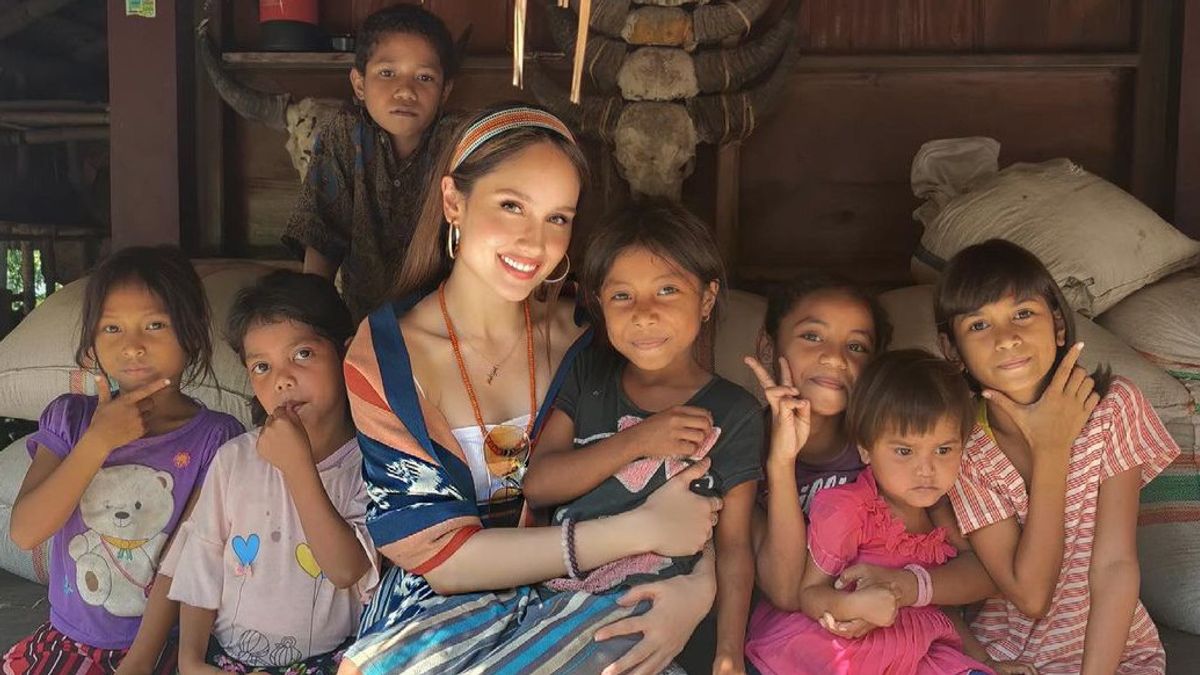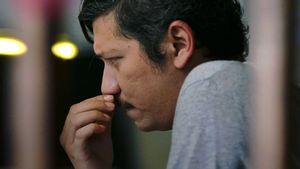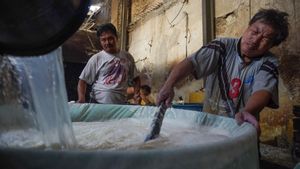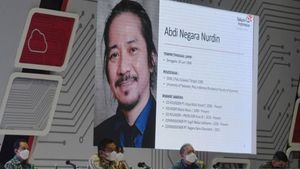JAKARTA - The name Cinta Laura has been a trending topic on Twitter since Monday morning, May 31. In the video, Cinta expresses her views on money management. Instead of being consumptive with expensive items, Cinta admits that she prefers to donate her money. Simple. But what Cinta said opened a discussion about one of the thorny issues of this country: justice, in this context the redistribution of wealth.
This view was expressed by Cinta when she was a guest on Gritte Agatha's YouTube channel. In one of the broadcast sessions, Cinta was asked about her reasons for saving money in shopping for goods and clothes.
"Why am I so frugal because from a young age I was taught to see everything from a broad perspective. It doesn't mean I don't like good things, yes. I'm guilty if I buy something new or expensive," said Cinta.
"I think about it, for example, buying a branded bag costs Rp30 million. Imagine, how many families or children can I send to school or feed with Rp30 million and I use Rp30 million to buy a bag. It's not worth it," continued the 27-year-old virgin.
What Love said sounded simple. Whether we realize it or not, this view reflects the important and critical issues of this country. About economic equity through the redistribution of wealth in order to realize social justice, the ideals of Pancasila.
Pancasila ideals

"Social justice for all Indonesian people," is stated in the fifth point of Pancasila. Social justice involves many aspects. In the context of thinking Love is the equal distribution of economic empowerment.
Economist Bhima Yudhistira Adhinegara said what Cinta did could be a solution to overcome inequality. This way of thinking is important to transmit, although it cannot be the main option in the redistribution of wealth.
"Models such as giving social funds, philanthropy is good, but not the only solution. It's only temporary and the amount also depends on the generosity of the privileged people," Bhima told VOI, Monday, May 31.
An effective way to ensure the redistribution of wealth from the upper class like Cinta touches the poor is by optimizing the tax system from upstream to downstream. In addition, the state must ensure high taxes for the rich.
"In some studies, such as Piketty's in the data period from 1910 to the 20th century, it is stated that an effective solution to overcome inequality is the implementation of higher taxes and compliance," Bhima said.
Learn from the United States (US), which in 1950 took the crazy step of setting a tax rate of 80 percent or the top marginal tax rate to encourage equal distribution of economic empowerment for the poor. As a result, income inequality has decreased significantly.
"So, first check whether the tax report has complied, then proceed to philanthropy. That's the right path," said Bhima, who is also the Director of the Center of Economic and Law Studies (CELIOS).
In the context of Indonesia, so far the tax contribution of the rich is still low. Based on Forbes data in the list of the richest people in Indonesia in 2019, it is known that their total wealth is estimated to reach Rp1,884.4 trillion.
Meanwhile, the realization of PPh 21 as of November 2019 reached Rp133.1 trillion. And that includes people from all income classes. "So far, the average contribution of the rich to total tax revenue is 0.8% or Rp1.6 trillion."
Raising the taxes of the super-rich

Indonesia is growing as the largest economic power in Southeast Asia. Every year, the number of super-rich people -- that is, those with a net worth exceeding $1 million or Rp14.2 billion -- is increasing.
This condition can actually be utilized by the government through optimizing tax revenues. The taxes on the super-rich have to be raised. This method can be useful, considering the state deficit has reached Rp553 trillion.
The national economic recovery budget as an effort to contain the impact of the COVID-19 pandemic has become a serious burden on state finances. Indonesia also experienced its first recession since 1998, with tax revenues only reaching 89.25 percent or Rp1,019 trillion last year. That figure missed 10 percent of the target of Rp1,198 trillion.
Quoting from The Conversation, Monday, May 31, a study supports the idea of increasing taxes on the super-rich. Through increased tax revenues, the government can redistribute wealth through incentives or social assistance. This method is considered effective in reducing income inequality in the community.
Inequality

The number of rich people in Indonesia continues to increase as the economy recovers. A study by Knight Frank, a consulting firm in London predicts that there will be 21,430 high net worth individuals or people with a net worth of more than 1 million US dollars in 2020. That number is predicted to increase by 110 percent to 45,063 by 2025.
Still from the study, ultra-high net worth individuals or people with a net worth exceeding 30 million US dollars or IDR 434.5 billion are predicted to number 673 people. Their number in 2025 will increase rapidly by 67 percent to 1,125. With this figure, Indonesia will become the country with the fastest-growing number of super-rich individuals in Asia.
This is ironic because at the same time the problem of poverty in Indonesia has become more serious in the last three years. The pandemic has hit this. In September 2020, there were 27.5 million poor people, or 10.19 percent of the nation's population.
Indonesia's Gini coefficient also rose, from 0.3 in 2000 to 0.4 in 2015. This is tantamount to an increase in inequality in income distribution. As a country with inequality problems, Indonesia ranks number six in the escalation of emergencies around the world.
The ratio is that the four richest people in Indonesia have more wealth than the 100 million poorest people combined. And as Bhima said, taxes are the most effective instrument of reducing income inequality and redistributing wealth from the rich to the poor.
Tax issues
Indonesia has a big problem in tax management. The ratio of tax to Gross Domestic Product aka the ratio of tax revenue to the country's overall economy is very low: 10.8 percent in 2018.
Try to compare it with other Southeast Asian countries. Singapore and Malaysia, for example, recorded a tax-to-GDP ratio of 13.2 percent and 12.5 percent respectively in the same year.
Today Indonesia imposes a 30 percent income tax on residents earning more than IDR 500 million per year. This figure is far from ideal.
Other countries, such as Japan and Sweden demand a 60 percent tax on the income of their citizens. Meanwhile, in the United States (US), President Joe Biden also recently announced a proposal to raise income taxes for people who earn more than 1 million US dollars a year.
Looking at the conditions above, the government, in this case, the Ministry of Finance, still has room to increase the income tax up to 45 percent or 50 percent. Do it gradually.
*Read other information about ECONOMY or read other interesting articles from Yudhistira Mahabharata.
Other SOLID NEWS
SEE ALSO:
The English, Chinese, Japanese, Arabic, and French versions are automatically generated by the AI. So there may still be inaccuracies in translating, please always see Indonesian as our main language. (system supported by DigitalSiber.id)














